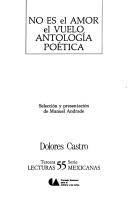| Listing 1 - 10 of 11 | << page >> |
Sort by
|
Book
ISBN: 9682987237 Year: 1996 Publisher: Aguascalientes, Ags. Instituto Cultural de Aguascalientes
Abstract | Keywords | Export | Availability | Bookmark
 Loading...
Loading...Choose an application
- Reference Manager
- EndNote
- RefWorks (Direct export to RefWorks)

ISBN: 9682942624 Year: 1992 Publisher: México, D.F. Consejo Nacional para la Cultura y las Artes
Abstract | Keywords | Export | Availability | Bookmark
 Loading...
Loading...Choose an application
- Reference Manager
- EndNote
- RefWorks (Direct export to RefWorks)
Book
Year: 1960 Publisher: Mexico Jus
Abstract | Keywords | Export | Availability | Bookmark
 Loading...
Loading...Choose an application
- Reference Manager
- EndNote
- RefWorks (Direct export to RefWorks)
Book
ISBN: 9686479023 Year: 1991 Publisher: Aguascalientes Aguascalientes Instituto Cultural de Aguascalientes Gobierno del Estado de Aguascalientes
Abstract | Keywords | Export | Availability | Bookmark
 Loading...
Loading...Choose an application
- Reference Manager
- EndNote
- RefWorks (Direct export to RefWorks)
Book
ISBN: 9048553776 9463725954 Year: 2023 Publisher: Amsterdam : Amsterdam University Press,
Abstract | Keywords | Export | Availability | Bookmark
 Loading...
Loading...Choose an application
- Reference Manager
- EndNote
- RefWorks (Direct export to RefWorks)
The replacement of the Roman Empire in the West with emerging kingdoms like Visigothic Spain and Merovingian Gaul resulted in new societies, but without major population displacement. Societies changed because identities shifted and new points of cohesion formed under different leaders and leadership structures. This volume examines two kingdoms in the post-Roman west to understand how this process took shape. Though exhibiting striking continuities with the Roman past, Gaul and Spain emerged as distinctive, but not isolated, political entities that forged different strategies and drew upon different resources to strengthen their unity, shape social ties, and consolidate their political status.
Group identity --- Social integration --- Leadership --- Ability --- Command of troops --- Followership --- Inclusion, Social --- Integration, Social --- Social inclusion --- Sociology --- Belonging (Social psychology) --- Collective identity --- Community identity --- Cultural identity --- Social identity --- Identity (Psychology) --- Social psychology --- Collective memory --- Gaul --- Spain --- Gallia --- Gaule --- History. --- History --- Social conditions. --- Social conditions --- Late Antiquity, Merovingian Gaul, Visigothic Spain, Authority, Power, Leadership, Identity, Social Cohesion.
Digital
ISBN: 9789048553778 Year: 2023 Publisher: Amsterdam Amsterdam University Press
Abstract | Keywords | Export | Availability | Bookmark
 Loading...
Loading...Choose an application
- Reference Manager
- EndNote
- RefWorks (Direct export to RefWorks)
Book
ISBN: 9789708020992 Year: 2007 Publisher: México, D.F. Instituto Nacional de Bellas Artes
Abstract | Keywords | Export | Availability | Bookmark
 Loading...
Loading...Choose an application
- Reference Manager
- EndNote
- RefWorks (Direct export to RefWorks)
Book

ISBN: 9789048543595 Year: 2020 Publisher: Amsterdam
Abstract | Keywords | Export | Availability | Bookmark
 Loading...
Loading...Choose an application
- Reference Manager
- EndNote
- RefWorks (Direct export to RefWorks)
Digital

ISBN: 9789048543595 Year: 2020 Publisher: Amsterdam Amsterdam University Press
Abstract | Keywords | Export | Availability | Bookmark
 Loading...
Loading...Choose an application
- Reference Manager
- EndNote
- RefWorks (Direct export to RefWorks)
Book

ISBN: 9789048553778 9789463725958 Year: 2023 Publisher: Amsterdam
Abstract | Keywords | Export | Availability | Bookmark
 Loading...
Loading...Choose an application
- Reference Manager
- EndNote
- RefWorks (Direct export to RefWorks)
| Listing 1 - 10 of 11 | << page >> |
Sort by
|

 Search
Search Feedback
Feedback About UniCat
About UniCat  Help
Help News
News